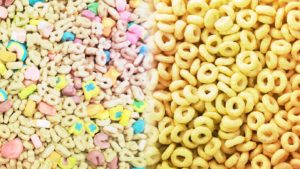
Glyphosate, the active ingredient in the Monsanto herbicide Roundup, does not pair well with breakfast. Last week a California jury ordered Monsanto to pay $289 million in damages to a man dying of cancer, which he says was caused by repeated exposure to Roundup.
In the wake of that jury verdict, the Environmental Working Group released test results showing that the weed-killing (and possibly crop-killing) poison glyphosate is present in 43 of the 45 cereals tested by an independent laboratory, including Cheerios, Lucky Charms, Quaker Oats, and other foods that kids love. Here’s how the companies have responded so far:
General Mills, the company behind Cheerios and Lucky Charms, sent this statement:
Our products are safe and without question they meet regulatory safety levels. The EPA has researched this issue and has set rules that we follow as do farmers who grow crops including wheat and oats. We continue to work closely with farmers, our suppliers and conservation organizations to minimize the use of pesticides on the crops and ingredients we use in our foods.
Here’s how Quaker replied:
We proudly stand by the safety and quality of our Quaker products. Producing healthy, wholesome food is Quaker’s number one priority, and we’ve been doing that for more than 140 years.
Quaker does not add glyphosate during any part of the milling process. Glyphosate is commonly used by farmers across the industry who apply it pre-harvest. Once the oats are transported to us, we put them through our rigorous process that thoroughly cleanses them (de-hulled, cleaned, roasted and flaked).
Any levels of glyphosate that may remain are significantly below any regulatory limits and well within compliance of the safety standards set by the Environmental Protection Agency (EPA) and the European Food Safety Authority (EFSA) as safe for human consumption.
BY Melissa Locker